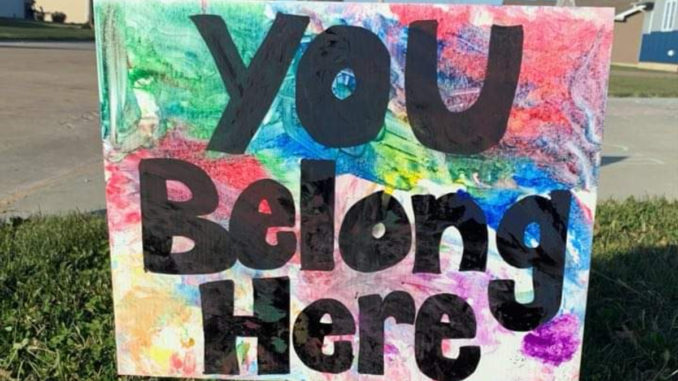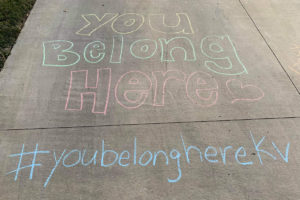
Two posters were found along East Normal Avenue featuring hateful speech, including a racial slur.
This act initiated several responses including a “there is no place for hate at Truman” campaign on campus, a “you belong here” campaign within the community and a senior capstone project from a Truman State University student.
Justin Jones, deputy chief of the Kirksville Police Department, was alerted to the signs by the Truman Department of Public Safety.
Jones said his department was limited in what they could do about the signs because it had little information.
“It is a frustration to me,” Jones said. “I can understand and be empathetic, but the student who took the picture of those signs did not want to talk to police. That hindered us in some way to get a time period.”
Jones said some officers canvassed the area where the signs were reported to be and talked to residents. However, from what the police know, the signs were not breaking any laws, Jones said.
“Had they been used to harass somebody or if someone came forward and said, ‘Hey these signs were put in my yard,’ then they would have been at least a peace disturbance,” Jones said.
The apartments where the signs were placed were at the corner of Mulanix and Normal streets. Jones said in the past, these apartments were filled with students, however, over time, many Congolese residents have moved into the apartments.
He said this is the first time he can remember bigoted posters targeted specifically at Kirksville’s African American community.
Jones said the posters were deplorable and he wishes racist acts like this did not happen in his own community.

“Overall, I think our community is still made up of goodhearted people who will welcome anyone with open arms,” Jones said. “Unfortunately, there are bigoted people everywhere, and Kirksville is no different than any other community.”
Jones said there was an incident similar to this in March of 2019. Typed up fliers were posted on the edge of downtown at A.T. Still University’s campus.
The signs were targeted at the immigrant population in Kirksville. Truman’s College Democrats unequivocally condemned the presence of white supremacy in the community back in 2019 when the signs hit social media.
“Kirksville has a thriving immigrant population which has enriched the experience of everyone who calls this place home,” a written statement from the College Democrats said. “We are welcoming to people of all nations, all faiths and all cultures because we know our diversity is our strength. It is time to come together once again to combat this abhorrent extremist ideology, which is rooted in cowardice and hate.”
The signs in 2019 also initiated the start of the Truman campaign “There is no place for hate at Truman,” and the most recent signs started a wave of community members posting “you belong here” signs in response.
Chetanae Ellison, a senior art and psychology major at Truman, found the posters, posted them to her social media and then took them down. She is now using them in her senior capstone to create awareness and dialogue about hate towards people of color.
Listen to this week’s episode of Dry Ink on this story
Ellison refused to give any of her information to the police or be a part of the investigation. She said that was for her own safety.
“I don’t know who is in the police department, and I don’t feel like I can trust them with who I am and where I live and how involved I am with this,” Ellison said. “Unfortunately, that could end my life and that is the reality of it. It is anxiety due to what has happened to my people in the past.”
Ellison said the presence of the sign worried her, and she never wants to put her own safety at risk. She said people could want to get rid of her and she didn’t feel comfortable asking the police for protection. She said she doesn’t know who made those signs or who they might be affiliated with, so she opted out of the investigation for her own safety.
Ellison said she was on her way to Ophelia Parrish to work on a project when she came across the posters. She said she was in disbelief and it was the most blatant form of hate she had seen in person. Ellison said she felt shocked, upset and her jaw dropped. She explained that the posters made her think about who she was and what she wanted to do as an artist.
Ellison said her community has worked so hard to get in a position where people of color are not second class citizens, but the climate of today has pushed back the progress. She said racism has always existed, but now that people do not experience any criminal or social repercussions, people are more ok with sharing bigotted ideals.
“I have been here for four and a half years,” Ellison said. “Throughout those years, I have personally seen blatantly racist things. They are subliminal racist things like I only understand because I know the context of it all.”
She mentioned a truck with confederate flags that drives around town and through campus as an example.
Ellison said to her, that is racist, but she understands there are some people who do not really know what it means.
“I cannot say with 100% [certainty] that it is a racist act towards me, but this poster? That is,” Ellison said.
Ellison said she doesn’t believe Kirksville is getting away from these ideals.
“These mindsets do not show up overnight,” Ellison said. “People are being raised this way, especially in this small town with little exposure to different cultures.”
Ellison’s capstone project is a self-portrait of her meditating, with her hair weaving in and out of the posters, along with two other panels depicting life as a black woman.

She said the message of her capstone project is partially awareness.
“I am aware, my community is aware it has been happening for years now, but I feel like a lot of students and people are oblivious to how racist it is in the town because it doesn’t affect them,” Ellison said. “I wanted to start a conversation about that.”
She said she also wants to give other people of color some kind of guidance on how to handle situations like this emotionally, which is through meditation and grounding yourself.
The hate speech, she said, no longer triggers her because she has a deeper understanding. Her capstone is all about meditating and getting over initial reactions.
“Deep inside, I want to destroy it,” Ellison said. “I don’t want it to exist. Since it is hatred, I don’t want that to exist. We have to tune ourselves enough to fight it. Hate is going to exist, no matter how angry you are at it. You cannot give it the power to make us angry.”
Ellison said the posters cannot be destroyed because they are useful for teaching others.
Her piece explores facets of Black experience and traumas like sexualization, dehumanization and disconnection from their ancestors.
Lauri Millot, Title IX Coordinator and Institutional Compliance Officer, said the sign was reported to her by various sources. Students, staff and the Bias-Related Incident Response website. The Bias-Related Incident Response seeks to support students, respond in an educational and preventative manner and inform the Truman community about reported bias incidents.
Millot said she thinks it is possible the sign was intentionally placed in an area where it would be easily visible by large numbers of people. The event could be related to other incidents in the past, which is something that is being considered, Millot said.
Millot said incidents of this type are unacceptable. She explained that they can cause emotional, psychological or physical harm to students of color and allies. Millot said she thinks preventing incidents of this type is hard, but prevention starts with education and difficult conversations.
“Everyone has attitudes, biases and blind spots, yet I truly believe individuals have the ability to change,” Millot said. “Hateful conduct cannot be tolerated and when we see it or hear it, we need to call it out.”
Bertha Thomas, diversity and inclusion consultant at Truman, said it is reassuring to have a positive response to an event like this. She said it can bring a community together if people are upset it happened and feel that it was inappropriate. At a Kirksville City Council meeting Nov. 2, Mayor Zac Burden condemned the actions and pledged his support to the people of color community in Kirksville.
“You need to break it down to rebuild,” Ellison said. “Love trumps all.”
